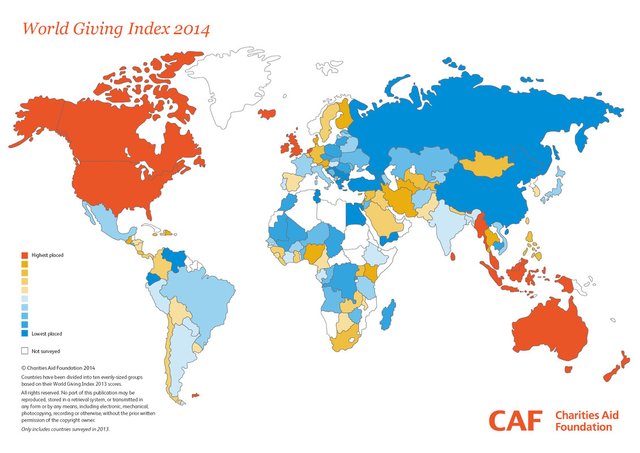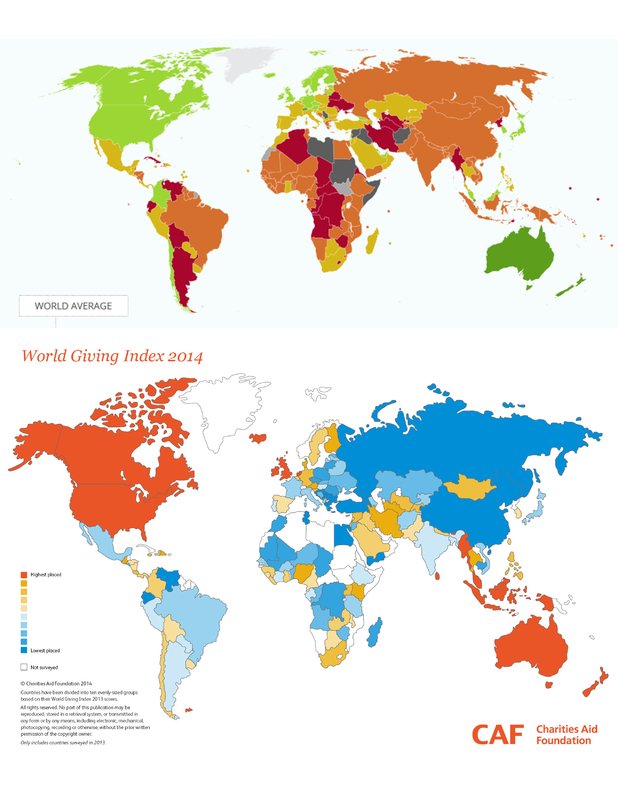A tought about charity and economic freedom
There is a very widespread myth that without the state, or, in other words, without a coercive agency that forces people to pay taxes, which will be used for the benefit of society and the most needy, the poor would be left to their own luck.
Nothing more wrong than this statement. I once read: The higher the state, the lower the citizen, and logic, together with the empirical facts, confirm exactly this.
The topic here is charity, and charity goes hand in hand with human rights and popular participation, since doing right and good for our fellow citizens within society is the role of society itself, that is, through the active participation of the population within it.
Going straight to the point, one of the ways to measure spontaneous solidarity is to analyze the time and money people dedicate to volunteering, that is, to measure if they have done some activity with positive impact on third parties, without receiving any material compensation in return.
We use statistics from the Wolrd Giving Index, which each year features volunteer numbers around the world, and measures the percentage of people who have practiced charity. The criteria are: giving money and/or time to an organization and helping a needy person.

This is a map of 2014, the countries in red are the most charitable, followed by the yellows and then the blue ones. First are countries like USA, Canada, Australia, New Zealand, United Kingdom, The Netherlands. In the second places, Finland, Sweden, Slovenia, some of the Middle East, Chile and so on. The less charitable ones are Brazil, Venezuela, Ecuador, Argentina, Russia, China, Paraguay, and so on.
Now let's compare with the 2014 map of economic freedom of the Heritage Foundation and the Wall Street Journal.

Here the countries in green are the most economically free, stand out USA, Canada, Chile, UK, Switzerland and so on. Yellows are relatively free, such as Mexico, Peru, Uruguay, Portugal, South Africa, Italy. Those in red and orange are the least free, such as our Brazil, Venezuela, Argentina, almost all of Africa, and the bloc that goes from Russia to India.
Now let's see both of the maps togheter:

As we can see, there is a strong relation between charity and economic freedom. So, why this correlation? Well, this is what I think:
In a free society, the amount of individual responsibility has to be high. The corollary of freedom is responsibility, without it, there would be no way for society to maintain itself. When there is freedom and responsibility, people need prudence to safeguard themselves for the future, since it is their responsibility, without the “father state” to take care of them. They are then more encouraged to, for example, save money, make a life insurance. This fact, by itself, stimulates a more austere and superb behavior, stimulating attitudes that do not aim only at the immediate present.
Alongside this, most individuals have a natural altruism rooted in themselves, and since social pressure tends to despise primary selfishness, in a free society people feel a greater need to help others. When people have freedom and responsibility, these people tend to become aware that if they do nothing for the needy, they will be left to their own luck, which shocks their natural altruism and their education.
Since many of these altruistic people have already been through difficult conditions, and on that occasion someone has certainly helped them in some way, they feel a certain moral obligation to reciprocate the favor, this is called reciprocity. The needy themselves know that they receive voluntary help, which in some way prevents them from abusing this aid, because they know they can stop receiving it. It is one thing to have timely help to get up, another is to be completely dependent, without striving to improve.
And finally, the altruistic people, knowing that the needy will not abuse their goodwill, and if they do, they will lose the benefits, this person who helps will be more encouraged to help once they know that in case of abuse, they can stop the work. It could be seen that both in theory and in practice, charity and volunteering go hand in hand with economic freedom, in an interesting relation.
A free society has its own natural means of solidarity, and these are now barely visible to us (here in Brazil), mainly because a giant state has already monopolized almost all social assistance, absorbing resources and money that the society would spend for this.
A failed system managed by a state that promises care from the cradle to the grave encourages selfishness and diminishes altruism. When the state increases, all other things begin to disappear, freedom, individuality, benevolence, and morality.
-> References links: http://www.heritage.org/ & http://www.cafonline.org/
Hi @thomasmmaker,
This gem of a post was discovered by the OCD Team!
Reply to this comment if you accept, and are willing to let us share your gem of a post! By accepting this, you have a chance to receive extra rewards and one of your photos in this article may be used on our compilation post!
You can follow @ocd – learn more about the project and see other Gems! We strive for transparency.
Cheers
Downvoting a post can decrease pending rewards and make it less visible. Common reasons:
Submit
Sure, feel free to share it! :)
Downvoting a post can decrease pending rewards and make it less visible. Common reasons:
Submit
Economic freedom is the best social program!
Downvoting a post can decrease pending rewards and make it less visible. Common reasons:
Submit
Econ is my shitttttt. mixed with some non profit. yesssirrrr. thanks for writing this buddy
Downvoting a post can decrease pending rewards and make it less visible. Common reasons:
Submit
:D
Downvoting a post can decrease pending rewards and make it less visible. Common reasons:
Submit
:)
Downvoting a post can decrease pending rewards and make it less visible. Common reasons:
Submit
Great explanation @thomasmmaker. Resteemed, upvoted and following :)
Downvoting a post can decrease pending rewards and make it less visible. Common reasons:
Submit
Thank you friend! I'll follow you back! :D
Downvoting a post can decrease pending rewards and make it less visible. Common reasons:
Submit
Thanks for sharing @thomasmmaker please help me grow
Downvoting a post can decrease pending rewards and make it less visible. Common reasons:
Submit
Sure friend! We are here to help each other, followed!
Downvoting a post can decrease pending rewards and make it less visible. Common reasons:
Submit